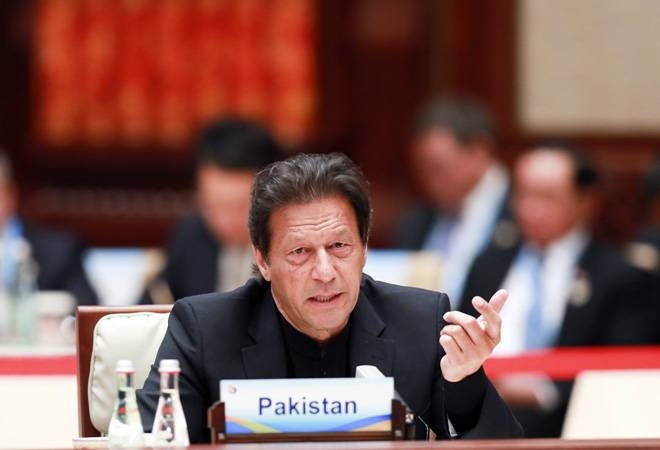FATF can maintain its credibility only by blacklisting Pakistan
Total Views |
Pakistan's Prime Minister Imran Khan has, in the last few days, become quite vocal in airing his deep concerns about the possible blacklisting of the country by the Financial Action Task Force (FATF) in its plenary meeting scheduled for 21-23 October, 2020. "If Pakistan is put on FATF's blacklist, then like Iran, deals will end. No international financial institutions will deal with us. It will impact the Pakistani Rupee and when Rupee starts to fall, we do not know how much it will fall. We do not have foreign reserves to save the Rupee. When Rupee falls, everything will become costly-electricity, gas and oil. Once we are on the blacklist, our entire economy will be destroyed due to inflation," Khan is reported to have stated in an interview given to a prominent news channel recently.
The statement and concern is more a product of political survival than concern for the country. Being quite wary of the possibility of being blacklisted, Khan is preparing his country for the worst and simultaneously trying to put the blame on India and his political opponents. "Who is trying to put us on the blacklist? It's India. For two years, India has been trying to blacklist Pakistan by lobbying with the international community," Khan is saying to everybody and anybody ready to listen to him. He is also voicing his concern about a hale and hearty Nawaz Sharif creating problems while sitting in exile in London and adding, for good measure, that the former premier is taking advantage of the humane act by his government in allowing him to leave the country for medical reasons. Khan is also leveraging the situation to put pressure on the Senate of the country which is dominated by the opposition and has rejected some FATF related bills.

That things are not good for Pakistan is quite evident by the fact that the Asia Pacific Group (APG), which is the regional arm of the FATF, has retained Pakistan in the enhanced follow-up list on the premise that the country has failed to curb terror funding and money laundering. The APG has opined that Pakistan has completely failed to implement the FATF's technical suggestions.
Notably, since coming on the FATF grey list in 2018, Pakistan has been given a number of deadlines to full fill its commitments, improve transparency in financial dealings and take action on the financing of terrorism. Even in February, 2020, FATF was quite vocal in its censure of Pakistan. Its press release dated February, 21, expressed, “concerns about Pakistan’s failure to complete its action plan in line with the agreed timelines and in light of the terrorist financing risks emanating from the jurisdiction.” Pakistan has done little since the February session of the FATF when it was again placed on the grey list instead of being blacklisted, as should have been the case. Whatever little has been done in matters concerning money laundering and tax evasion is with a distinct political bias directed against the political rivals of the ruling party like Nawaz Sharif and Asif Ali Zardari.
Also in February, 2020, In order to reduce pressure, the Pakistani Government as directed by its army, formulated a brazen plan of getting a lower court to convict the terrorist Hafiz Saeed for two terror crimes. The conviction coincided with the visit of UN Secretary General, Antonio Guterres, to Pakistan. The sentence held no consequence since it was liable for appeal in a higher court, but it was enough for the friends of Pakistan in the FATF (mainly China and Turkey) to ensure that the country continues in the grey list for another six months instead of being blacklisted. The February deadline, orchestrated by "good friend" China was supposed to be the last.
Blacklisting by the FATF is a devastating nightmare for Pakistan and yet the country is showing no inclination to mend its ways. There are two reasons behind this. The first is the confidence that its "friends in the organisation" will bail it out yet again. Three out of the 36 votes in the organisation can keep it out of the blacklist and such support is available from China, Malaysia and Turkey. The second reason behind this confidence is the assurance that good friend China and some other Islamic nations will come up in support should the blacklist sanctions be put in place. After all, the country is managing quite comfortably despite being on the grey list because of these friends.
In the meantime, Pakistan is working hard to pass new laws in compliance with its Anti-Money Laundering/ Countering Financing of Terror (AML/CFT) obligations and give its friends some leverage in the upcoming plenary session of FATF. Pakistan has been able to ward off the FATF blacklist for too long now while failing to stand by its promises made to the organisation and to the world. Since the last plenary session in February there has been a firm conviction across the world that if Pakistan fails to comply by October, the global body will put the country in the ‘Black List’ along with North Korea and Iran.
As things stand, Pakistan is far behind in implementing the recommendations from FATF and is, as usual, taking superficial actions to avoid the blacklist, or better still, get its name cut from the grey list itself. It is hoped that FATF will take a firm and righteous stand this time and not allow Pakistan to blatantly steer itself off the hook yet again. If Pakistan succeeds in its nefarious designs then the very credibility of the international organisation will get jeopardised. India is directly affected by the terror activities that emanate from Pakistani soil and needs to move fast and strong if she wishes to check the malevolent designs of the neighbouring country.


